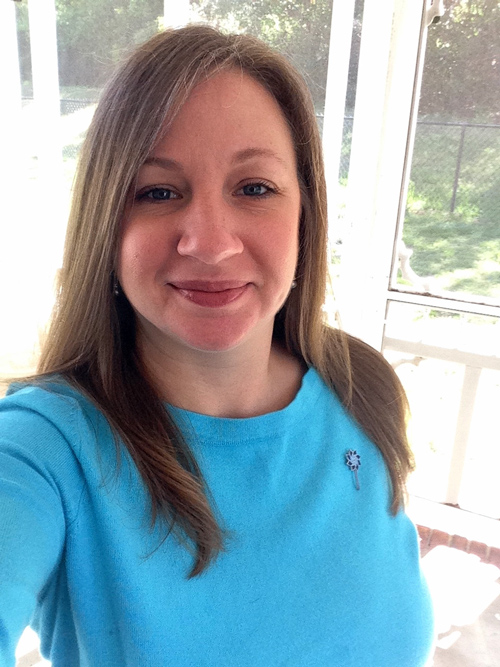Melissa Augsburger recently finished her field placement as a policy intern with Children’s Trust, a stint that allowed her to complete a Master of Social Work degree at the University of South Carolina. She writes about the call to change her career path as well as her experience working with our organization over the past year.
My story is not a new one.
For over 10 years, I enthusiastically pursued a path in the business field, successfully pouring my skills and talents into my career. I worked hard, I received a promotion. I worked harder, I bought a new car, I got a dog, I bought a house…
Along this path, I began to grow restless and noticed an absence of something in my career. I flirted with the idea of going back to school for a few years, but I was scared to risk leaving a life that was secure and steady. As time passed, however, that void never faded, but only deepened.
I knew I had to make a change.

Melissa Augsburger
I grew up with two loving parents – both with college degrees – who are still married today. I am the youngest of four girls, and by the time I was born, my parents had worked their way into the middle class. My father had paid leave, steady work hours and affordable health care. My mother was able to work part time simply to pursue her own personal and financial goals.
Our family did not have to worry about stable housing, money for food, affordable child care, and safety in our home and neighborhood. I was surrounded by people who possessed the social and economic ability to actively provide a stable, responsive, and enriching environment when I needed it the most – early childhood when 90 percent of brain development takes place.
In addition to tangible items, my parents also gave me something else – living lessons of humility and sharing what you have with others. And this was the something that was missing. I had been given so much, and now it was my time to give.
So I entered the Master of Social Work part-time program at the University of South Carolina without a clear picture of the end result but with three beliefs that aligned with the Code of Ethics for social workers:
- We are all shaped by both our internal strengths and our external environment.
- Our society perpetuates disparities in the external environment.
- Every child deserves the love, security, and opportunities that I experienced.
When I took my first policy class, I knew I had found my place. As a professor said, if you start seeing the same structural barriers and underlying issues in each client’s experiences, at some point you have to address the larger picture. When there is an evident structural barrier impeding client success, there is a need for a policy change.
For the final year of the program, students are in charge of selecting their field placement. When I learned about Children’s Trust, I felt this would be a perfect opportunity to grow and develop the policy, research, and advocacy skills that I would need in the future. And I was right, but that was not all I gained from my experience.
If I tried to write about everything I have learned under the supervision of Megan Branham, the director of policy for Children’s Trust, and through collaboration with the entire staff and community partners, the list would be pages long.
Most importantly, Children’s Trust has given me a framework for my future and helped me find my voice. My experience has given me the courage to speak out for those who cannot speak out for themselves.
Every child deserves the opportunity to experience safe, stable, nurturing relationships and live a life free of abuse and neglect. While I believe this is a shared vision for our nation’s children, the data shows us that we are falling short in unacceptable ways, both in South Carolina and across the country.
- In 2014, 27 percent of children in South Carolina were living in poverty. For African- American children, this number is disproportionally higher at 43 percent.
- 18,848 children were in founded investigations of abuse and neglect during the state fiscal year 2014-2015.
- Of South Carolina third graders in 2014, 21.1 percent tested below state standards in reading.
- Sixty-two percent of over 10,000 South Carolina adults surveyed in 2014 reported having at least one adverse childhood experience while growing up.
Children’s Trust and its numerous community partners are working to change the trajectory for our most vulnerable citizens. I have discovered there is a place in this work for me – and for all of us. We can examine the data to understand the issues, focus on prevention and early intervention, support our communities, and become an advocate for change.
From the first day of my field placement to the last, I have been able to interact with a dedicated group of people sharing a common goal. Each one has a special set of gifts and skills, and everyone gives of those talents in order to support the vision that every child deserves to thrive. While I may be leaving Children’s Trust, I know that they will continue to work tirelessly to reach that vision.
And no matter where I go next, I will carry these values with me.





